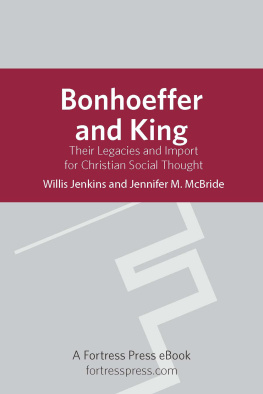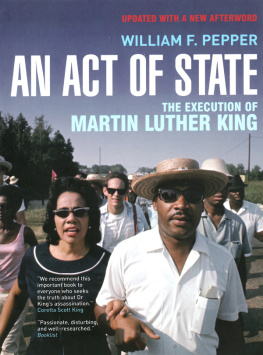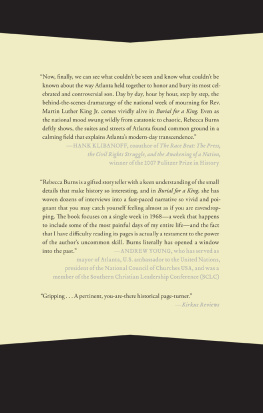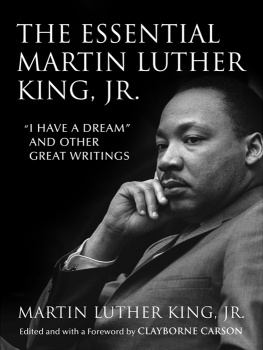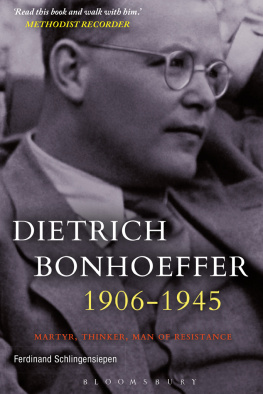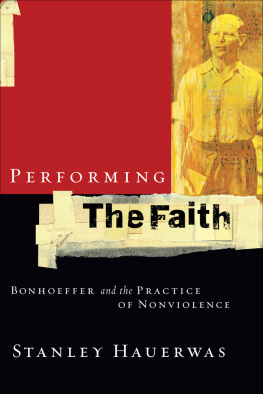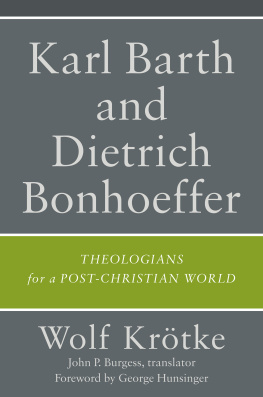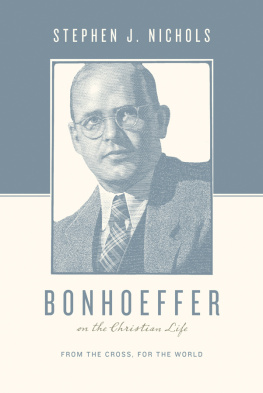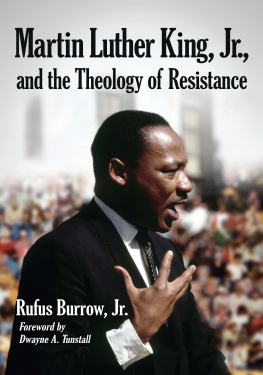
Bonhoeffer and King
Bonhoeffer and King
Their Legacies and Import for Christian Social Thought
Edited by Willis Jenkins and Jennifer M. McBride
Fortress Press
Minneapolis
BONHOEFFER AND KING
Their Legacies and Import for Christian Social Thought
Copyright 2010 Fortress Press, an imprint of Augsburg Fortress. All rights reserved. Except for brief quotations in critical articles or reviews, no part of this book may be reproduced in any manner without prior written permission from the publisher. Visit http://www.augsburgfortress.org/copyrights/contact.asp or write to Permissions, Augsburg Fortress, Box 1209, Minneapolis, MN 55440.
Scripture marked NRSV is taken from New Revised Standard Version Bible, copyright 1989 Division of Christian Education of the National Council of Churches of Christ in the United States of America. Used by permission. All rights reserved.
Scripture quotations marked NIV are from The Holy Bible, New International Version Copyright 1973, 1978, 1984 by International Bible Society. Used by permission of Zondervan Publishing House. All rights reserved. The NIV and New International Version trademarks are registered in the United States Patent and Trademark Office by International Bible Society. Use of either trademark requires the permission of International Bible Society.
Scripture marked KJV is taken from The New King James Version, copyright 1979, 1980, 1982 Thomas Nelson, Inc. Used by permission. All rights reserved.
Cover image: Brad Norr
Cover design: Brad Norr Design
Book design: PerfecType, Nashville, TN
Illustrations: Dietrich Bonhoeffer, Lewis Williams SFO 2003. Martin Luther King of Georgia, Br. Robert Lentz, OFM 1984. Images courtesy of Trinity Stores (800.699.4482) www.trinitystores.com
eISBN 9781451420395
Library of Congress Cataloging-in-Publication Data
Bonhoeffer and King / their legacies and import for Christian social thought / edited by Willis Jenkins and Jennifer M. McBride.
p. cm.
Includes bibliographical references and index.
ISBN 978-0-8006-6333-9 (alk. paper)
1. Christian sociology. 2. Bonhoeffer, Dietrich, 1906-1945. 3. King, Martin Luther, Jr., 1929-1968. 4. Christian ethics. 5. Church and social problems. 6. Social ethics. I. Jenkins, Willis. II. McBride, Jennifer M., 1977-
BT738.B618 2010
261.10922dc22
2010013484
Contents
Jennifer M. McBride
Emilie M. Townes
Stephen R. Haynes
Rachel Muers
Jean Bethke Elshtain
Larry L. Rasmussen
Josiah U. Young III
M. Shawn Copeland
Timothy P. Jackson
Craig J. Slane
Charles Marsh
Richard W. Wills Sr.
Raphael Gamaliel Warnock
Stephen G. Ray Jr.
Andre C. Willis
Glen H. Stassen
Geffrey B. Kelly
Gary M. Simpson
Michael Battle
Willis Jenkins
D ietrich Bonhoeffer and Martin Luther King Jr. exercise a peculiar hold on the Christian social imagination. They stand as compelling figures for Christian thought on justice and love. They are touchstones for reflection on social witness, political hope, and personal courage. We turn to them when considering how religious faith makes a political difference, what social form Christian confession should take, and how justice should confront violence. We consider their responses to the big questions of ethics and evil, religion and politics, theology and self-commitment, not only because their words offer vivid guides but because their lives enact brilliant, troubling dramas that place us anew before those questions.
The legacy of each leader, however, is also ambiguous, claimed by a wildly diverse range of interpreterspolitical conservatives and radicals, theological traditionalists and revisionists, Christians and humanists, debunkers and hagiographers. Books are constantly published from left and right that purport to recover the real King, and simply cataloguing the schools of claims on Bonhoeffers legacy has occupied academic volumes. While the two men were undoubtedly different from one another, as essays in this book show, their legacies are similar in that they are both so contested and so resonant. In ways rare for pastors of the last century, they are publicly remembered: both appear routinely in top ten lists of the most influential Christians, and statues of each stand in Westminster Abbey. Perhaps they figure so vividly in Christian memories precisely because the reception of their legacies remains so uncertain and controversial.
The idea for this book began from our participation in the Project on Lived Theology, which we first encountered as graduate students at the University of Virginia. In conversations with that community of scholars, pastors, and activists, we noticed how many Christian social thinkerswhether organic or academicshaped their thought in ongoing encounter with King or Bonhoeffer or both. In the years since, we have wondered how other conversations in the fields of theology and ethics have been shaped by these legacies. In 2008 we convened a panel at the American Academy of Religion dedicated to that question, which met as a joint session of the Martin Luther King Jr. Consultation and the Bonhoeffer: Theology and Social Analysis Group.
Those conversations helped frame this book. We invited leading Christian social thinkers to consider King and Bonhoeffer together in order to help us interpret their ambiguous legacies and the influence their memories have had on the central questions of Christian social thought. Each essay approaches a major issue in Christian ethics, with scholars who have written and taught both figures, sometimes together, presenting a single topic in light of the influence of both men. What does a mutual reading mean for our views of peacemaking and violence, racism and poverty, the institutional church, contemporary martyrdom, politics and responsibility, justice and reconciliation, the public pastorate?
These essays therefore not only interpret Bonhoeffer and King; more importantly, they engage the issues that construct their enduring theological and American importance. By receiving their legacies together, this book considers how the two figures help make sense of one another, where their respective thought contests one another, and what dangers to theology and memory lie in receiving them together. We think that this book will enliven classroom discussions, inform readers of both lives, and, we hope, help start new conversations in social ethics and Christian theology.
We wish to thank each of the contributors willing to offer an interpretation of two daunting legacies. We are grateful to Charles Marsh for inviting us into the work of the Project on Lived Theology and to all those engaged in the conversations of that community who have encouraged the development of this book. We have since moved into other academic communities. Willis acknowledges his indebtedness to students at Yale Divinity School who helped reshape his views of Bonhoeffer and King, and to colleagues who have entered conversation with him about the project, especially Emilie Townes and Andre Willis. He also thanks his research assistant Kathryn Salisbury, who did the index. Jennifer is grateful for a Postdoctoral Fellowship in Religious Practices and Practical Theology at Candler School of Theology, Emory University, which not only granted her time to work on this project but also stimulated the work in unforeseen ways, as the fellowship led her to a city bursting with contested legacies. She wishes to acknowledge colleagues at Emory that engaged the project, particularly Timothy P. Jackson, John Snarey, Andrea White, and Letitia Campbell. She is also thankful for the collegiality and friendship of Raphael G. Warnock at Ebenezer Baptist Church and for the ongoing conversations about Bonhoeffer and King at the Open Door Community.
Next page
